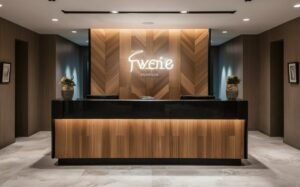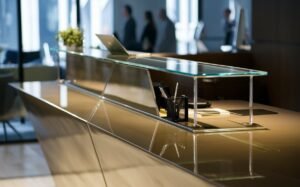let’s understand uses of a reception desk
A reception desk is the first point of contact for visitors and clients in an office or hotel lobby. It’s a focal point for providing customer service, answering queries, and directing people to specific areas. It can also provide a waiting area for guests, deliveries, and parcel pick-up.
The reception desk serves as the nerve center of any organization, acting as the first point of contact for visitors, clients, and employees alike. Its primary function is to provide a welcoming and organized space where guests can check-in, receive assistance, and gather information. From welcoming visitors with a warm smile to efficiently managing inquiries and appointments, the reception desk facilitates seamless communication and ensures a positive experience for all. Additionally, it serves as a hub for administrative tasks, such as managing mail, scheduling meetings, and coordinating logistics, contributing to the smooth operation of the office environment. With its strategic location and versatile functionality, the reception desk plays a vital role in shaping the overall impression and efficiency of an organization.



what is the purpose of a reception desk: The reception desk serves as the central hub of the reception area in a business or organization. Its primary purpose is to facilitate communication and interaction between visitors and staff members. Here are some key uses of a reception desk:
- Welcoming Visitors: The reception desk is often the first point of contact for visitors entering a facility. Receptionists stationed at the desk greet guests warmly, offer assistance, and provide information about the organization’s services, amenities, and policies.
- Managing Inquiries: Receptionists handle incoming phone calls, emails, and inquiries from visitors in person. They may answer questions, provide directions, or connect visitors with the appropriate staff members or departments.
- Checking In and Out: Visitors typically check in at the reception desk upon arrival, where they may be asked to sign in, provide identification, or register for appointments or events. Similarly, visitors may check out or complete any necessary paperwork before departing.
- Scheduling Appointments: Receptionists manage appointment schedules for executives, staff members, or meeting rooms. They coordinate meeting times, reschedule appointments as needed, and notify relevant parties of any changes.
- Handling Deliveries: Receptionists accept and log deliveries of mail, packages, and other items for the organization. They may notify recipients of incoming deliveries and ensure that items are safely stored or distributed to the appropriate recipients.
- Security Monitoring: Receptionists monitor access to the facility by verifying the identity of visitors and ensuring that only authorized individuals are allowed entry. They may also maintain visitor logs or issue visitor badges for security purposes.
- Administrative Support: In addition to front-line customer service duties, receptionists often provide administrative support to the organization, such as sorting mail, filing documents, and performing data entry tasks.
Overall, the reception desk plays a vital role in creating a positive and efficient experience for visitors while supporting the day-to-day operations of the business. It serves as a focal point for communication, coordination, and hospitality within the organization.

Also Read this : A Guide to Choosing Modular Furniture for Your Reception Desk
What Are the Benefits of Reception Desks?
Reception desks offer a range of benefits for businesses, including:
First Impressions:
- Professionalism: A well-designed reception desk creates a polished and professional first impression for visitors, clients, and potential partners.
- Branding: The reception area can be designed to reflect your company’s brand identity, colors, and values.
Improved Efficiency & Organization:
- Streamlined Workflow: Reception desks provide a dedicated workspace for receptionists, allowing them to manage visitor flow, answer questions, and direct people efficiently.
- Storage & Organization: Desks often have built-in compartments for storing paperwork, visitor logs, and office supplies, promoting a clutter-free and organized environment.
Security & Control:
- Access Control: Reception desks can act as a checkpoint, allowing receptionists to screen visitors and ensure only authorized personnel enter specific areas.
- Security Features: Modern desks may incorporate features like secure drawers and cabinets to protect confidential information.
Additional Benefits:
- Ergonomics: Some desks offer adjustable height or ergonomic features to improve comfort and prevent repetitive strain injuries for receptionists.
- Positive Work Environment: A well-designed reception area can contribute to a more welcoming and positive work environment for both employees and visitors.
Here are some additional points to consider:
- Types of reception desks: Different styles like curved or straight desks offer advantages in space optimization, aesthetics, and functionality.
- Technology Integration: Modern desks can incorporate features for digital check-in systems, visitor badges, or touchscreens for information display.
Overall, a reception desk serves as the central hub for visitor interaction and plays a significant role in shaping the overall impression and efficiency of your business. shree interior wudtech LLP is a leading Modular Furniture Manufacturers in Mumbai. we specialize in making innovative and stylish furniture.
also read this : Top Reception Desk Manufacturers in Navi Mumbai



One Response